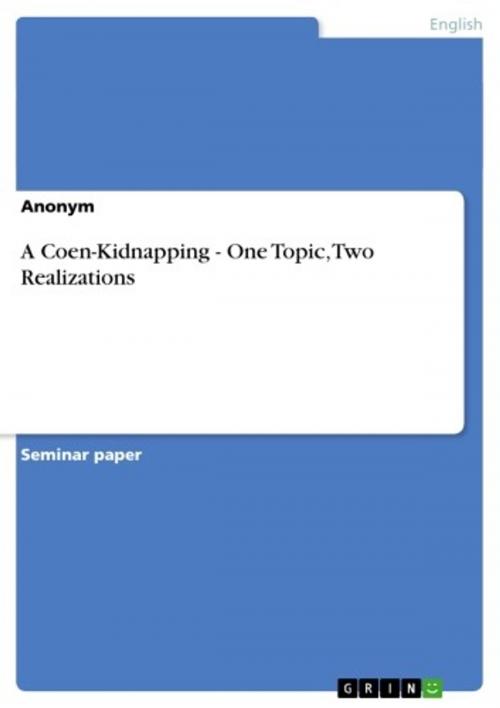A Coen-Kidnapping - One Topic, Two Realizations
One Topic, Two Realizations
Nonfiction, Entertainment, Drama, Anthologies| Author: | Anonymous | ISBN: | 9783638442152 |
| Publisher: | GRIN Verlag | Publication: | November 24, 2005 |
| Imprint: | GRIN Verlag | Language: | English |
| Author: | Anonymous |
| ISBN: | 9783638442152 |
| Publisher: | GRIN Verlag |
| Publication: | November 24, 2005 |
| Imprint: | GRIN Verlag |
| Language: | English |
Seminar paper from the year 2005 in the subject American Studies - Literature, grade: 1,0, Dresden Technical University, course: HS Outstanding Film Directors, 7 entries in the bibliography, language: English, abstract: In this paper for the seminar 'Outstanding Film Directors' I want to analyze two movies by Joel and Ethan Coen, namely 'Fargo' (1996) and 'The Big Lebowski', its successor from the year 1998. After introducing the movies along with their characters, storylines, symbolism, and other relevant issues, I am planning on pointing out to what extend they are similar and typically 'Coen-esque', and how they differ. Special attention will be paid to the kidnapping-theme used in both movies, to the display of violence, and to the stylistic devices, especially to those that define the various genres (detective story, western, etc.) utilized by the directors. The way the Coens play with the expectations of their viewers and critics is also supposed to be a topic of this work. However, before I begin my paper, I would like to introduce the directors to the reader. Joel and Ethan Coen, often referred to as the Coen brothers or the 'two-headed director', were born in St. Louis Park, Minnesota in 1954 and 1957 respectively. While Joel is always credited as the director, Ethan only appears as the producer. In reality though, both of them write, direct, and produce their movies, and also do the cutting, which might be one reason for their aforementioned nickname. Moreover, this fact underlines the humongous influence they have on the resulting product, as all the crucial production steps are carried into execution by them. It also explains the perfectionism to which they attach great importance. As the Coens have a clear vision of their movie-to-be and thus work hard at the preproduction, they will never accept improvisation. Rumor has it that every 'yah' in Fargo was actually scripted (Kilzer, p. 167). It is common knowledge in the business that ad-lib performances are not something these two directors appreciate. Little is known about their private life because the Coen brothers set value on keeping it out of the public eye. But since they do not include self-depictions or references to their lives in their films, even though many critics suppose so, this fact will not prevent the subsequent discussion of the two named movies.
Seminar paper from the year 2005 in the subject American Studies - Literature, grade: 1,0, Dresden Technical University, course: HS Outstanding Film Directors, 7 entries in the bibliography, language: English, abstract: In this paper for the seminar 'Outstanding Film Directors' I want to analyze two movies by Joel and Ethan Coen, namely 'Fargo' (1996) and 'The Big Lebowski', its successor from the year 1998. After introducing the movies along with their characters, storylines, symbolism, and other relevant issues, I am planning on pointing out to what extend they are similar and typically 'Coen-esque', and how they differ. Special attention will be paid to the kidnapping-theme used in both movies, to the display of violence, and to the stylistic devices, especially to those that define the various genres (detective story, western, etc.) utilized by the directors. The way the Coens play with the expectations of their viewers and critics is also supposed to be a topic of this work. However, before I begin my paper, I would like to introduce the directors to the reader. Joel and Ethan Coen, often referred to as the Coen brothers or the 'two-headed director', were born in St. Louis Park, Minnesota in 1954 and 1957 respectively. While Joel is always credited as the director, Ethan only appears as the producer. In reality though, both of them write, direct, and produce their movies, and also do the cutting, which might be one reason for their aforementioned nickname. Moreover, this fact underlines the humongous influence they have on the resulting product, as all the crucial production steps are carried into execution by them. It also explains the perfectionism to which they attach great importance. As the Coens have a clear vision of their movie-to-be and thus work hard at the preproduction, they will never accept improvisation. Rumor has it that every 'yah' in Fargo was actually scripted (Kilzer, p. 167). It is common knowledge in the business that ad-lib performances are not something these two directors appreciate. Little is known about their private life because the Coen brothers set value on keeping it out of the public eye. But since they do not include self-depictions or references to their lives in their films, even though many critics suppose so, this fact will not prevent the subsequent discussion of the two named movies.















